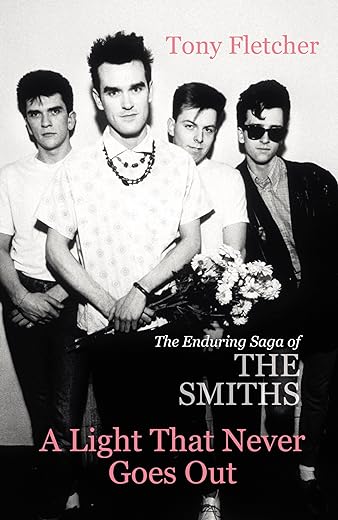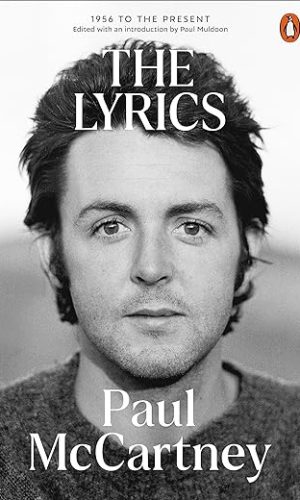A Light That Never Goes Out: The Enduring Saga of the Smiths
£12.30£14.20 (-13%)
To this day, they were, their fans believe, the best band in the world. Critics and sales figures told a similar story. Yet for all their brilliance and adoration – their famously energetic live shows routinely interrupted by stage invasions – The Smiths were continually plagued by their reticence to play the game, and by the time of 1987’s Strangeways Here We Come, they had split.
Tony Fletcher’s A Light That Never Goes Out – part celebration, part paean – moves from Manchester in the nineteenth-century to the present day to tell the complete story of The Smiths. The product of extensive research and unprecedented access, it will serve to confirm The Smiths as one of the most important and influential rock groups of all time.
Read more
Additional information
| Publisher | Windmill Books (5 Sept. 2013) |
|---|---|
| Language | English |
| Paperback | 704 pages |
| ISBN-10 | 0099537923 |
| ISBN-13 | 978-0099537922 |
| Dimensions | 12.9 x 4.2 x 19.8 cm |










by Lawrence Mikkelsen
It’s almost twenty years since I read Johnny Rogan’s seminal tome, Morrissey and Marr: The Severed Alliance. In those pre-internet days, before the Smiths were an “institution” worthy of the covers of such traditionalist music papers as Mojo and Uncut, Rogan’s tell all biography was a revelation. Up until then, everything I’d read about my beloved band had been assembled in snippets – an NME article here, a music encyclopaedia entry there. The fact that Morrissey called down a fatwa on the author only made the content seem more scandalous, and probably a little more believable too.
Two decades later, and as Tony Fletcher points out in the forward to his own book, there’s been little else to compete, other than Simon Goddard’s excellent trainspotter guides, Songs that Saved Your Life and Mozapedia, and more fan-orientated books like All Men Have Secrets. However, despite the paucity of books on The Smiths, there has been a shedload of magazine cover stories in the above-mentioned magazines, and the webisphere thrives with numerous comprehensive sites, some sublime, most ridiculous. Given the closed nature of Morrissey’s inner circle, and the very pubic nature of Joyce and Rourke’s legal issues with their ex-bandmates (or should that be employers?) I really had to wonder if there was much more to uncover.
So what does A Light That Never Goes Out: The Enduring Saga of The Smiths offer? To a newcomer, it is an excellent and comprehensive history of the band, and to anyone who has read all of the above, not a lot more. Given the time that has passed since Rogan’s (apparently tell-all) book, there seems little else to tell. There’s no new scandals (other than Marr – older and wiser, no doubt – being far more forthright on the bands’ drug use) and precious new information for those already initiated into the cult of Morrissey and Marr. Yes, the band was appallingly badly managed from the get-go. Yes, Morrissey had an increasingly annoying habit of failing to show for important appointments. Yes, Andy Rourke got fired for being on the gear and Craig Gannon got hired and fired with little in the way of acknowledgement or recompense. And that’s pretty much the story, retold once more.
Tony Fletcher – an engaging and unfussy writer – is constantly at pains to point out just how young Marr was, and what a prodigy he was, with constant references to his age. (And, to this now-37 year old reviewer, it is quite amazing to consider that Marr wrote The Queen is Dead when he was only 23, and that the first two songs the duo wrote together were Reel Around the Fountain and Suffer Little Children.) Marr is clearly the hero of the book, and Morrissey remains something of an enigma throughout – he’s certainly far less of a `character’ or engaging presence than in Rogan’s book. (One interesting point of omission is that of Morrissey’s personal relationships. For all the people who want to “out” Morrissey, it’s quite incredible that no one has ever come forward to dish any dirt of Morrissey’s personal relationships, or lack thereof.) Another issue – and this is a problem of most rock biographies – is that the time spent on the formation of the band is hugely out of proportion to the latter part of their career. Both Marr and Morrissey view Strangeways … as their masterwork, and Fletcher seems to agree, yet the sole chapter devoted to this album flies by far too quickly.
Whilst being a very thorough history of what actually happened, the frustrating thing about this book is that it’s far less enlightening about the more nebulous nature of the band, and what made them such a phenomenon and why the immediately attracted such a fanatical following. Perhaps more oral history with the bands’ fans might had aided in this endeavour? Or close access to Morrissey’s inner circle. I’m really not sure. This is an engaging read, and I’d certainly recommend it, but I still feel the definitive history of The Smiths is yet to be written.
by Devil’s Advocate
If you read Morrisey’s bleating autobiography you could be forgiven for thinking that The Smiths were Morrisey and Morrisey alone.
This book evens the playing field and emphasises Marr’s incredible role along with the input of Rourke and Joyce.
The book is extremely well researched even if Moz didn’t cooperate.
In fact, the band doesn’t form until p210 so the rest is deep background on the players and their city – making it a book for devotees first and foremost!!
The break up is painfully chronicled and becomes inevitable all too soon.
Marr’s frustration, Moz’s narcissism and no management killed this beautiful creature in its prime.
The book does leave you feeling what could have been…although be thankful that Marr did knock on that door all those years ago….
PS- a personal favourite part of the book for me is the detailed description of the recording of “How Soon is Now”one of the greatest songs ever put to record.
Frankly Mr Fletcher…you are definitely NOT a flatulent pain in the ass!!!
by L. Wren
bought as a prese, very well received
by anna birschel
Having seen the Smiths live in 1984, I wanted to delve into their world once again and was not disappointed in Tony Fletcher’s biography. He puts the band in the Indie/Major context of the early 1980’s and manages to weave the band’s personalities into this by looking at how even a band at their peak can disintegrate. Recommended
by Carolyn Smith
Not surprisingly, this book isn’t really for women. It’s written from a male fan’s point of view, with lots of tedious facts and geeky details. If you skip the boring bits (at least two-thirds of the book), it’s worth reading for some of the more human insights, but it’s hard work a lot of the time. Both author and band take themselves so seriously – it’s amusing at first, but then becomes annoying.It’s only pop music, FFS!
by Luke h
Brought this for my mum for her birthday as she’s a big smiths fan. She said she loves the book and it’s a really interesting read.
by Stevo
A decent read but a lot of “filler” content. Could have lost a couple of chapters which delved into Irish roots and family history which to be honest was a chore on the eyes. That aside I enjoyed the book but marked down for a lot of boring and uninteresting waffle.
by Lee
Just an outstanding book, incredibly well researched by the author, delving back into not only the teenage years of the band and their backgrounds, but also the environment they grew up in which sheds further light on their later decisions. It’s a brilliant snapshot of the period and if you have any Smiths records in your collection, i just know you’ll get them out and reminisce and think just how brilliant the band were at their peak.
I would definitely recommend this book to anyone contemplating buying it, the author gets some great anecdotes from band members and other key people around the band during the time and places them into the timeline perfectly.